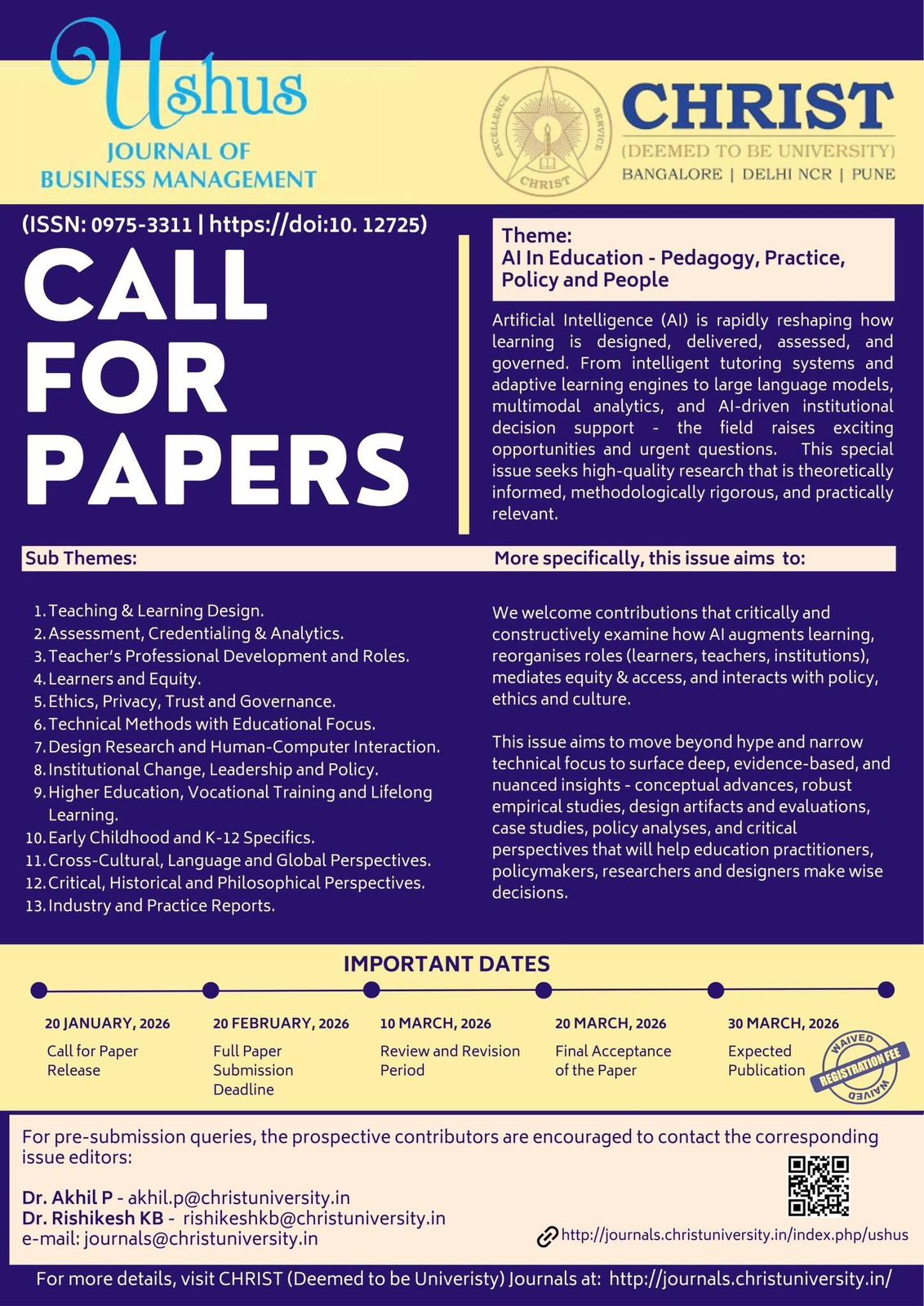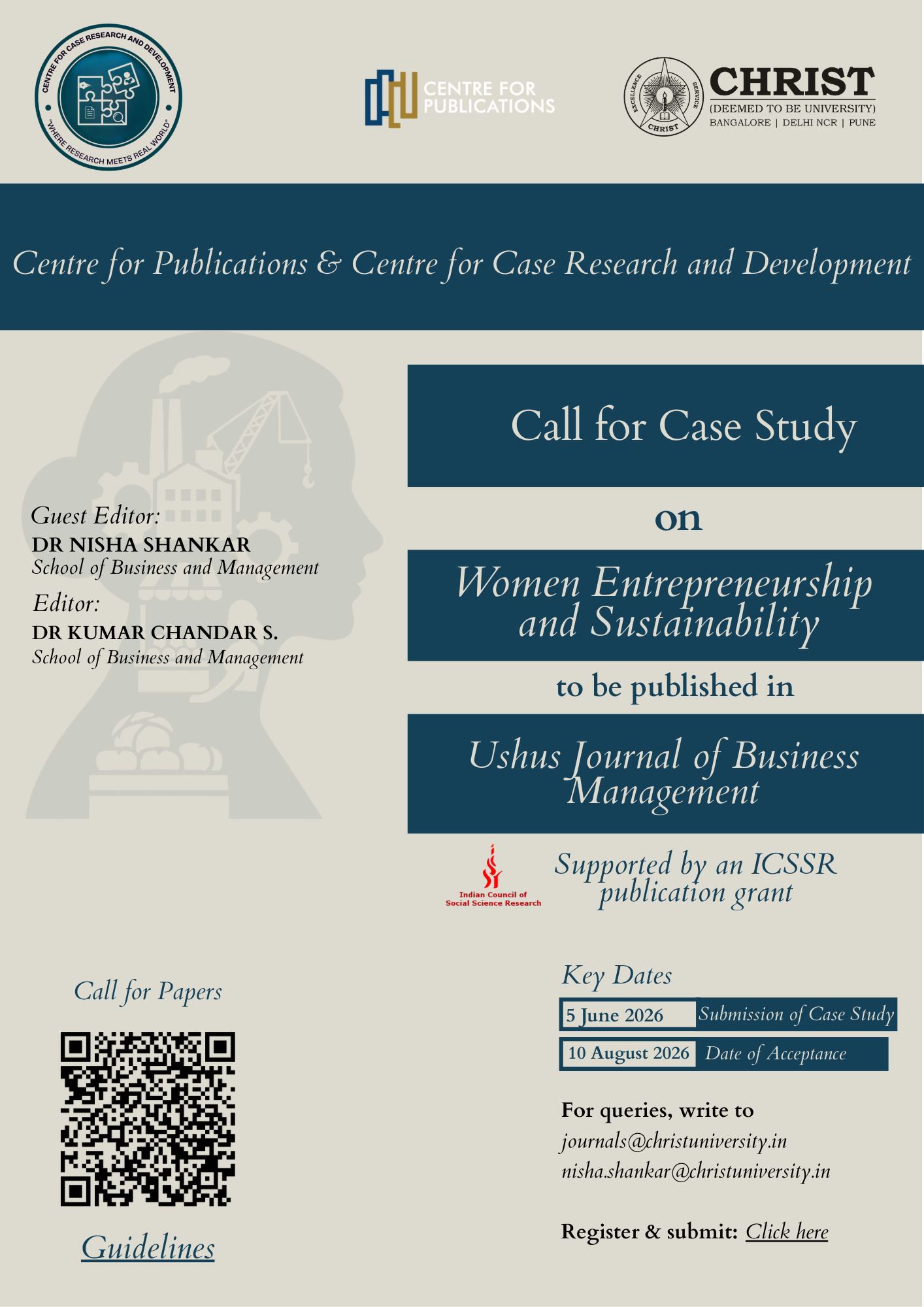Relationship between the Altman Z Score and Stock Prices of Indian Manufacturing Firms
DOI:
https://doi.org/10.12725/ujbm.69.3Keywords:
Z score, Stock market, India, bankruptcyAbstract
Purpose
This study investigates the relationship between the Altman Z-Score and stock prices of Indian manufacturing firms to evaluate its efficacy as a predictor of financial distress and aid in investment decision-making.
Methodology
The research employed an explanatory design, analyzing financial data of 18 randomly selected listed manufacturing firms in India over five years. Altman Z-Scores were calculated using financial ratios, and their trends were compared with stock price movements. Hypothesis testing was conducted to establish correlations between Z-Scores and stock prices.
Findings
The analysis revealed that the Altman Z-Score effectively predicts corporate financial health. Firms with declining Z-Scores showed signs of financial instability, often entering the distress zone, while firms with stable or improving Z-Scores demonstrated financial resilience. A significant correlation was observed between Z-Scores and stock price trends, underscoring its predictive reliability.
Practical Implications
The Altman Z-Score provides investors and corporate decision-makers with a robust tool for assessing financial health, identifying warning signs of potential distress, and formulating strategic responses. It also supports more informed investment choices based on a company’s financial stability.
Future Research Direction
Further studies can expand the application of the Altman Z-Score to other industries, integrate non-financial variables such as management practices, and compare its predictive accuracy with alternative financial models across diverse economic contexts
References
Aggarwal, R., Inclan, C., & Leal, R. (1999). Volatility in Emerging Stock Markets. The Journal of Financial and Quantitative Analysis, 34(1), 33. https://doi.org/10.2307/2676245
António Miguel Martins, Álvaro, P., & Cró, S. (2023). Stock market reaction to the military conflict between Russia and Ukraine: an event study for the European tourism and hospitality industry. Journal of Applied Economics, 26(1). https://doi.org/10.1080/15140326.2023.2261756
Ashraf, S., & Baig, M. A. (2019). Is the Indian Stock Market Efficiently Inefficient? An Empirical Investigation. Indian Journal of Finance, 13(7), 7. https://doi.org/10.17010/ijf/2019/v13i7/145532
Bakry, W., Kavalmthara, P. J., Saverimuttu, V., Liu, Y., & Cyril, S. (2021). Response of stock market volatility to COVID-19 announcements and stringency measures: A comparison of developed and emerging markets. Finance Research Letters, 46, 102350. https://doi.org/10.1016/j.frl.2021.102350
Boubaker, S., Goodell, J. W., Pandey, D. K., & Kumari, V. (2022). Heterogeneous impacts of wars on global equity markets: Evidence from the invasion of Ukraine. Finance Research Letters, 48(3), 102934. https://doi.org/10.1016/j.frl.2022.102934
Brounen, D., & Derwall, J. (2010). The Impact of Terrorist Attacks on International Stock Markets. European Financial Management, 16(4), 585–598. https://doi.org/10.1111/j.1468-036x.2009.00502.x
Chen, M.-H., Jang, S. (Shawn), & Kim, W. G. (2007). The impact of the SARS outbreak on Taiwanese hotel stock performance: An event-study approach. International Journal of Hospitality Management, 26(1), 200–212. https://doi.org/10.1016/j.ijhm.2005.11.004
Chowdhury, E. K., Khan, I. I., & Dhar, B. K. (2021). Catastrophic impact of Covid‐19 on the global stock markets and economic activities. Business and Society Review, 127(2). https://doi.org/10.1111/basr.12219
Gu, X., Zhang, W., & Cheng, S. (2021). How do investors in Chinese stock market react to external uncertainty? An event study to the Sino-US disputes. Pacific-Basin Finance Journal, 68(3), 101614. https://doi.org/10.1016/j.pacfin.2021.101614
Hassan, M. K., Pandey, D. K., Boubaker, S., & Kumari, V. (2022). Indo-China border disputes and heterogeneous sectoral returns: An event study approach. Finance Research Letters, 4(3), 103277. https://doi.org/10.1016/j.frl.2022.103277
JOSH, N. A., H. Kent BAKER, & AGGARWAL, A. (2023). The Russia-Ukraine War’s Impact on Stock Markets in Asia-Pacific, the United States, and Europe. Eurasian Journal of Business and Economics, 16(31), 39–53. https://doi.org/10.17015/ejbe.2023.031.03
Kollias, C., Kyrtsou, C., & Papadamou, S. (2013). The effects of terrorism and war on the oil price–stock index relationship. Energy Economics, 40(1), 743–752. https://doi.org/10.1016/j.eneco.2013.09.006
Krishnan, D., & Dagar, V. (2022). Exchange Rate and Stock Markets During Trade Conflicts in the USA, China, and India. Global Journal of Emerging Market Economies, 14(2), 097491012210827. https://doi.org/10.1177/09749101221082724
Muhammad Niaz Khan. (2024). Market volatility and crisis dynamics: a comprehensive analysis of U.S., China, India, and Pakistan stock markets with oil and gold interconnections during COVID-19 and Russia–Ukraine war periods. Future Business Journal, 10(1). https://doi.org/10.1186/s43093-024-00314-8
P, G., Kumar K, S., & C. Bhat, D. (2022). IMPACT OF RUSSIA-UKRAINE WAR ON INDIAN STOCK MARKET - AN EVENT STUDY WITH REFERENCE TO NIFTY 50. International Journal of Research -GRANTHAALAYAH, 10(4), 161–167. https://doi.org/10.29121/granthaalayah.v10.i4.2022.4566
Pal, S., & Garg, A. K. (2020). Macroeconomic surprises and stock market responses in view of global linkage – A study of Indian stock market. Cogent Economics & Finance, 8(1), 1839171. https://doi.org/10.1080/23322039.2020.1839171
Papakyriakou, P., Sakkas, A., & Taoushianis, Z. (2019). The impact of terrorist attacks in G7 countries on international stock markets and the role of investor sentiment. Journal of International Financial Markets, Institutions and Money, 61(3), 143–160. https://doi.org/10.1016/j.intfin.2019.03.001
Parab, N., Naik, R., & V. Reddy, Y. (2020). The Impact of Economic Events on Stock Market Returns: Evidence from India. Asian Economic and Financial Review, 10(11), 1232–1247. https://doi.org/10.18488/journal.aefr.2020.1011.1232.1247
Safitri, H., & Hariyanto, D. (2023). Capital Market Reaction in Asean Member Countries Against Market Shock: Russia and Ukraine War. Journal of Asian Multicultural Research for Economy and Management Study, 3(4), 30–37. https://doi.org/10.47616/jamrems.v3i4.353
Shapiro, D. M., Switzer, L. N., & Mastroianni, D. P. N. (2011). War And Peace: The Reaction Of Defense Stocks. Journal of Applied Business Research (JABR), 15(3), 21. https://doi.org/10.19030/jabr.v15i3.5668
Shi, Y., Wang, L., & Ke, J. (2021). Does the US-China trade war affect co-movements between US and Chinese stock markets? Research in International Business and Finance, 58(3), 101477. https://doi.org/10.1016/j.ribaf.2021.101477
Soraya, N. (2023). AN EVENT STUDY: INDONESIAN CAPITAL MARKET REACTION TO THE RUSSIA-UKRAINE WAR ANNOUNCEMENT. JRAK, 15(1), 114–120. https://doi.org/10.23969/jrak.v15i1.6676
Tavor, T. (2011). The Impact of Terrorist Attacks on the Capital Market in the Last Decade. International Journal of Business and Social Science, 2(12). https://doi.org/10.30845/ijbss
Umar, M., Riaz, Y., & Yousaf, I. (2022). Impact of Russian-Ukraine war on clean energy, conventional energy, and metal markets: Evidence from event study approach. Resources Policy, 79(102966), 102966. https://doi.org/10.1016/j.resourpol.2022.102966
Downloads
Published
How to Cite
Issue
Section
License
Copyright (c) 2025 Raunak Nigam, Aayush Roy

This work is licensed under a Creative Commons Attribution-NonCommercial-NoDerivatives 4.0 International License.



